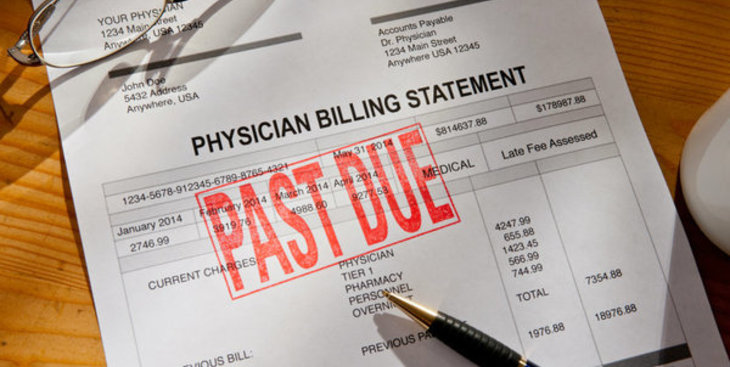 Some legal scholars say thatpatients should already be protected against some of the highestsurprise medical billing charges under longstanding conventions ofcontract law. (Photo: Shutterstock)
Some legal scholars say thatpatients should already be protected against some of the highestsurprise medical billing charges under longstanding conventions ofcontract law. (Photo: Shutterstock)
Joaquin Lopez had emergency gallbladder surgery after rushing to an ER last year. He has beenhaggling with Baptist Memorial Hospital in Memphis over what heowes ever since.
|The 37-year-old college professor was hit with a nearly $8,000bill from the out-of-network hospital — that was after the$11,000 he and his insurer had already paid.
|Related: Consumers more likely to pay hospital bills ifcosts are clear
|Consumers are increasingly vulnerable to such so-called balance bills, which represent the differencebetween what insurers pay and hospitals' list prices. List pricescan be several times higher than what they accept from Medicare orin-network insurers.
|Congress is considering bipartisan legislation to limit balance billing. But some legalscholars say that patients should already be protected against someof the highest, surprise charges under long-standing conventions ofcontract law.
|That's because contract law rests on the centuries-old conceptof “mutual assent,” in which both sides agree to a price beforeservices are rendered, said Barak Richman, a law professor at DukeUniversity.
|Thus, many states require, and consumers expect, writtenestimates for a range of services before the work is done — whetherby mechanics and plumbers or lawyers and financial planners.
|But patients rarely know upfront how much their medical carewill cost, and hospitals generally provide little or noinformation.
|While consumers are obligated to pay something, the question ishow much? Hospitals generally bill out-of-network care at listprices, their highest charges.
|Without an explicit price upfront, contract law would requiremedical providers to charge only “average or market prices,”Richman said.
|In several recent cases, for example in New York and Colorado, courts have stepped in to mediate cases where apatient received a big balance bill from an out-of-networkprovider. They ordered hospitals to accept amounts far closer towhat they agree to from in-network private insurers orMedicare.
|“This is the amount they are legally entitled to collect,” saidRichman.
|Lopez's bill came after he sought help at the emergency roomfollowing excruciating abdominal pain. Sent home with painmedication, he awoke hours later to a phone call from the hospital:Come back! A review of his tests showed he needed surgery. Hedidn't stop to ask if the hospital was in his network, or for acost estimate.
|So, in an example like that, is there mutual assent?
|Hospitals say yes, that signed admission forms, which include a promiseto pay, constitute mutual assent, even if there was no pricedisclosed.
|No, counters Richman. If a tax preparer provided no upfrontestimate, he could not suddenly bill a client for $10,000 if thegoing rate for the service was $1,000 or less. The higher fee wouldnever hold up in court of law, since there was no “mutual assent”about price.
|But what, if anything, should Lopez offer to pay? What isreasonable or average in a system where the price of a hipreplacement can range from $15,000 to $150,000, or a blood test canbe $5 to $500?
|Based on the hospital's list prices, Lopez's bill came to nearly$21,000. Insurer Cigna, using a formula it said is similar to whatMedicare uses, said the maximum it would cover was $11,160. It paid80 percent of that lower amount, and Lopez paid the remainder.Baptist hospital is billing Lopez for nearly $8,000 more, saying itwants the full charges.
|“I'm an economist,” said Lopez, who teaches at the University ofMemphis. “I understand how abusive these practices are. There isnot a single market price.”
|Indeed. Healthcare Bluebook, a consumer website that uses claimsdata to estimate costs , shows gall bladder surgery in Memphiscosts as little as $14,000, but could be tens of thousands more,with a “fair price” of about $18,000 — which is generally less thanfull billed charges, but more than in-network insurers wouldpay.
|That complexity — and the cost of hiring an attorney — have madelegal challenges to medical bills on the basis of contract lawrelatively scarce.
|Also, “it's not a well-settled area of the law,” said Hall.
|Even though hospitals have lost some cases, their arguments havealso found traction.
|The Virginia Supreme Court last year ruled in favor of a hospital,saying admission paperwork patient Glenn Dennis signed in theemergency room was a valid contract. The hospital had sued him overan $84,000 bill for his out-of-network care.
|Still, the court left open the key question of just how much ofthat Dennis owed, sending that back to a lower court. That courtpreviously ruled that Dennis owed only about $500 on top of the$27,255 his health insurer had paid. That reflected a discount thehospital commonly gave uninsured patients, the circuit court judgewrote. The two sides are still working on a settlement.
|For those caught up in the disputes, determining a fair price ishard.
|“That's where courts struggle, creating health care prices,”said Mark Hall, director of the Health Law and Policy Program atWake Forest Forest University, who backs the contract lawprotection theory.
|One way is to look at what hospitals accept for in-network carefrom private insurers. But hospitals generally object to releasingthat, saying it's a trade secret.
|A 2017 Texas Supreme Court ruling has, at least for now, brokenthrough this position. It said that hospitals in some legaldisputes must disclose those in-network rates they allow in-networkinsurers to pay.
|“Hospitals are really trying to prevent this sort of thingbecause they are uncomfortable having someone ask them to justify[their charges],” said George Nation, a law professor at LehighUniversity in Pennsylvania, who filed a court brief in the Texascase on behalf of the patient's argument.
|In June, the hospital involved in the dispute asked for arehearing, saying such disclosure would weaken its bargainingpower. Several other hospitals are backing its request,illustrating the broad concern.
|Lopez has hired a lawyer to fight his bill.
|Consumers in some states might have legal backup under balance-billing laws.But rules vary, often don't apply to all types of insurance and maycover only emergency medical treatment costs.
|Tennessee's law, which went into effect in July, requireshospitals to notify patients of estimated costs and that they couldreceive balance bills.
|After getting a balance bill, consumers should attempt tonegotiate a reduced amount, said Wendy Netter Epstein, a health lawprofessor at DePaul University College of Law. Online lookup toolslike HealthcareBluebook or FairHealth can provide estimates of average costs forprocedures.
|Lopez said he offered to pay 20 percent of the disputed amount,but it has not — so far — been accepted.
|Baptist Memorial Hospital encourages patients to file appealsand, if a better offer is made by the insurer, “we accept it anddismiss the patient's balance,” said David Elliott, vice presidentof managed care and CEO of Baptist Health Services Group, in anemailed statement.
|Lopez has appealed twice to insurer Cigna to cover more of thebill —without success.
|For now, his lawyer has written to the hospital, disputing thatLopez owes more than was already paid by the insurer. The lettersaid Lopez planned to avail himself of any protection under stateor federal law.
|Kaiser Health News isa nonprofit news service covering health issues. It is aneditorially independent program of the Kaiser Family Foundation,which is not affiliated with Kaiser Permanente.
|Read more:
- Is outlawing surprise medical bills really inconsumers' best interests?
- Majority of people have received unexpected medicalbills in the past year
- Jury deems Centura Health $230K surgical bill'unreasonable,' awards $766
Complete your profile to continue reading and get FREE access to BenefitsPRO, part of your ALM digital membership.
Your access to unlimited BenefitsPRO content isn’t changing.
Once you are an ALM digital member, you’ll receive:
- Critical BenefitsPRO information including cutting edge post-reform success strategies, access to educational webcasts and videos, resources from industry leaders, and informative Newsletters.
- Exclusive discounts on ALM, BenefitsPRO magazine and BenefitsPRO.com events
- Access to other award-winning ALM websites including ThinkAdvisor.com and Law.com
Already have an account? Sign In







